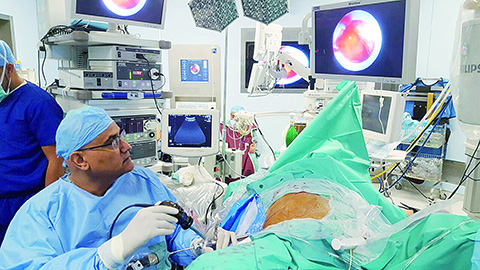 KUWAIT: Professor Adel Al-Henayyan performs the operation at Mubarak Hospital. (Inset) A picture taken during the operation. —KUNA photos
KUWAIT: Professor Adel Al-Henayyan performs the operation at Mubarak Hospital. (Inset) A picture taken during the operation. —KUNA photosKUWAIT: A Kuwaiti medical team at Mubarak Hospital's urology unit led by Professor Adel Al-Henayyan and his assistant Dr Mohammed Hasabo managed to remove multiple kidney stones from the right kidney of a female Asian patient in her forties, who had been in pain for several months. Speaking to reporters after the surgery, Henayyan said that a new technology that utilizes high-frequency laser was used to break the stone into small particles, which helps shorten the surgery's period, cut hospitalization period to two days at most and help patients return to normal life within a week.
Chronic diseases
Separately, the Ministry of Health (MoH) has begun practical steps to set up a special department for protection against chronic non-communicable diseases, a ministry official said yesterday. Such a department is of national priority for implementing programs and updating data about factors that contribute to spread of such diseases, acting undersecretary Dr Walid Al-Falah said in a statement.
Establishing such a division serves Kuwait's obligations toward the international community with respect of promoting public health awareness. Minister of Health Dr Jamal Al-Harbi has adopted the idea of creating the new department, in tandem with the existing cooperation with the World Health Organization (WHO) and to help prepare regular reports to the UN agencies, the WHO and regional relevant organizations.
Dr Falah indicated at a new approach to integrate health issues into the State various policies. The MoH has adopted prior plans to deal with such diseases, namely diabetes, cancer, heart and respiratory illnesses. Surveys conducted by the ministry and the WHO in 2013 and 2015 showed hike of smoking, physical inactivity and unhealthy eating. They also revealed that proportion of people in Kuwait who abstain from eating vegetables and fruits stood in the range of 83 percent. Physical inactivity, 62.6 percent and obesity, 40.2 percent ( both genders).
Special centers
In other news, Chairman of Kuwait's Multiple Sclerosis (MS) Society Yousef Al-Kandari has suggested to form special centers designated for the treatment of the demyelinating disease. Kandari pitched the idea in a statement yesterday during the second Gulf Cooperation Council (GCC) MS forum, where he noted that building these centers has now become imperative due to a spike in MS cases. Moreover, he revealed that "1,700 Kuwaitis have been diagnosed with MS," adding that the figure is expected to rise "not only in Kuwait but in the region as a whole."
On the GCC MS forum, Kandari said that it aims to examine major challenges that could potentially encumber the treatment of the nervous system disorder. He also pointed out that the form yielded plans to form a GCC MS union to generate awareness on the chronic ailment. MS is an unpredictable, often disabling disease of the central nervous system that disrupts the flow of information within the brain, as women are more susceptible to the disease than men.
By Meshaal Al-Enezi and KUNA










